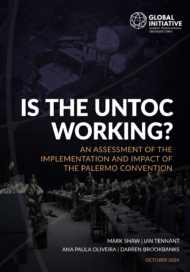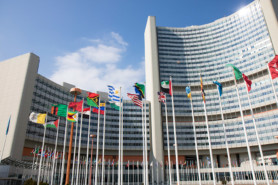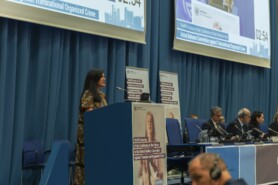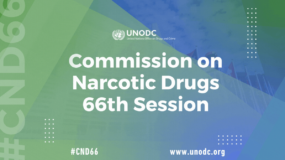Posted on 13 Dec 2024
On 6 December 2024, the Permanent Mission of Norway to the International Organizations in Vienna and the Global Initiative Against Transnational Organized Crime (GI-TOC) organized a briefing for delegations in Vienna to highlight key developments in organized crime as member states begin the preparatory process for the next UN Crime Congress. The 15th Congress on Crime Prevention and Criminal Justice will be held in Abu Dhabi in 2026, and regional preparatory meetings will begin in the first half of 2025.
Civil society has been a central part of the Congress throughout its history, yet recent years have brought challenges to its participation in multilateral processes. At the same time, civil society’s engagement with the UN’s organized crime mandates has grown, reflecting a shared commitment to improving the effectiveness of UN instruments and programmes. As a contribution from the GI-TOC, this briefing highlighted trends in organized crime that delegates should consider as they look ahead to the regional preparatory meetings, which will initiate the drafting of the outcome declaration for the Congress.
Since the last Crime Congress in 2021, criminality has increased globally and the gap between criminality and state resilience to organized crime has widened, as reported in the 2023 Global Organized Crime Index. Organized crime networks are becoming more resourceful, agile and adaptable, taking advantage of globalization, technology and geopolitical fragmentation. The declaration that emerged from the 2021 Congress failed to grasp the scale of this threat. The 2026 Congress is therefore a prime opportunity to better assess the threat, and present ambitious and innovative solutions to respond to it.
The Vienna briefing underscored the scale of the challenge by sharing the GI-TOC’s initiatives from around the world, including:
- The growth of scam centres in South East Asia and the other criminal markets that intersect with this trade, as well as the central role of Myanmar in regional organized crime.
- The increasingly transcontinental nature of organized criminal groups, as shown by the global role of Western Balkan criminal groups and their use of Dubai as a hub.
- The changing nature of drug markets in Europe, including the increasing import and use of cocaine, cannabis and synthetics, the growing prominence of mid-size ports and the violence associated with these criminal markets.
- How conflict, particularly in Sudan, is shaping human smuggling dynamics in North Africa and the Sahel.
- How drug markets in West Africa are shifting to include the synthetic drug ‘kush’, and the involvement of Balkan and Latin American criminal groups in the global drug trade.
- How armed groups in Central Africa, working with mercenaries from Russia, are taking advantage of instability to exploit natural resources and increase their power.
- The growing harms of heroin trafficking and use in East and Southern Africa, and the continued use of trafficking routes in the Indian Ocean despite the opium ban in Afghanistan.
A video recording of the event is available here. The GI-TOC looks forward to participating in the regional preparatory meetings for the Congress in 2025 and will report on the process. In doing so, we hope to ensure that the threat of transnational organized crime is recognized and that civil society can play a central role in addressing it.



